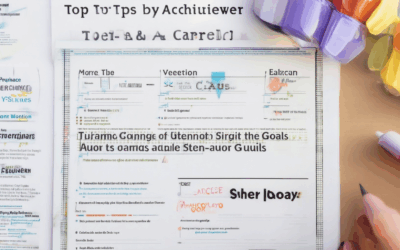Stress has become a pervasive challenge in our fast-paced, hyper-connected world, with individuals across various demographics feeling overwhelmed by the demands of modern life. Whether juggling professional responsibilities, managing personal relationships, or navigating the complexities of daily existence, the quest for effective stress management has never been more urgent. In this comprehensive guide, we explore proven strategies to alleviate stress, offering a holistic approach that addresses both mental and physical well-being. From lifestyle adjustments to mental health techniques, physical activity to workplace strategies, and daily routines to mindfulness practices, this article delves into actionable tips that empower you to take charge of your stress and discover a more balanced, fulfilling life. By examining a wide range of approaches, we aim to provide you with a roadmap to reduce stress, enhance productivity, and improve overall quality of life.
Key Takeaways
- Practice Deep Breathing Techniques: Use Box Breathing to instantly reduce stress.
- Engage in Physical Activity: Regular exercise boosts endorphins and alleviates tension.
- Mindfulness and Meditation: Dedicate 10 minutes daily to stay grounded and reduce anxiety.
- Set Realistic Goals: Break tasks into manageable steps to avoid overwhelm.
- Limit Caffeine Intake: Opt for herbal teas or decaf to prevent stress hormone spikes.
- Connect with Nature: Spend time outdoors weekly for mood enhancement and vitamin D benefits.
- Journal Your Thoughts: Writing down worries aids emotional processing and clarity.
- Seek Support Systems: Join groups or confide in friends to share experiences and gain perspective.
- Improve Sleep Quality: Maintain a consistent bedtime routine for 7-9 hours of restful sleep.
- Stay Organized: Use planners or digital tools to manage tasks efficiently.
- Eat Nutritious Meals: Fuel your body with fruits, veggies, lean proteins, and whole grains.
- Limit Screen Time: Reduce exposure to negative news and social media to minimize stress triggers.
- Seek Professional Help When Needed: Consult a therapist for tailored strategies when stress is overwhelming.
For more resources and guided practices, visit 7del.net.

Stress Management Strategies
- Practice Deep Breathing Techniques: Learn controlled breathing exercises like the 4-7-8 method to reduce stress and promote relaxation.
- Engage in Regular Exercise: Physical activity releases endorphins, helping to alleviate stress and improve mood.
- Prioritize Self-Care: Incorporate activities that bring you joy and fulfillment, whether it’s hobbies, meditation, or simply spending time with loved ones.
- Develop Time Management Skills: Break tasks into manageable steps and use tools like planners or calendars to stay organized and reduce overwhelm.
- Seek Support: Talk to friends, family, or professionals who can offer guidance and help you navigate challenging situations.
These strategies can be integrated into your daily routine to foster a sense of balance and control, ultimately contributing to long-term well-being.
What Are 6 Strategies to Reduce or Avoid Stress?
Stress is a common challenge in modern life, but with the right approach, it’s possible to manage and even eliminate it. Here are six effective strategies to help you reduce or avoid stress:
- Practice Regular Exercise : Physical activity is a powerful tool for managing stress. It helps release endorphins, improves mood, and reduces tension.
- Eat a Balanced Diet : Nutrient-rich foods like fruits, vegetables, whole grains, and lean proteins provide the body with essential nutrients to maintain energy and combat stress.
- Get Adequate Sleep : Sleep is crucial for recovery and mental clarity. Aim for 7-9 hours of quality sleep each night to recharge your body and mind.
- Engage in Relaxation Techniques : Incorporate practices like deep breathing, meditation, or yoga into your daily routine to promote relaxation and reduce anxiety.
- Set Realistic Goals : Overloading yourself with unrealistic expectations can lead to stress. Break tasks into manageable steps and celebrate small achievements.
- Practice Gratitude : Focusing on the positive aspects of life can significantly reduce stress. Take a few minutes each day to reflect on things you’re thankful for.
By implementing these strategies consistently, you can create a more balanced and stress-free lifestyle. Remember, taking care of your well-being is just as important as achieving your professional goals. Visit 7Del.net for more resources on self-improvement and mental health.

The 4 A’s of Stress Management
Stress management is essential for maintaining emotional, psychological, and physical well-being. Below are the four key components, known as the “4 A’s,” that form the foundation of effective stress management:
- Adaptability : The ability to adjust and adapt to changing circumstances is crucial. Life is unpredictable, and being able to roll with the punches helps reduce stress. Practice flexibility in your routines and approaches to challenges.
- Acceptance : Acknowledge the existence of stressors rather than ignoring them. Accepting stress as a natural part of life allows you to address it constructively rather than letting it fester. This doesn’t mean you have to like it, but embracing it can lead to better outcomes.
- Active Coping : Engage in activities that actively reduce stress. This includes exercises like meditation, deep breathing, yoga, or spending time in nature. These practices help reset your mind and body.
- Attitude : Cultivate a positive mindset. Stress often stems from our perception of events. By reframing challenging situations as opportunities for growth, you can alleviate tension and find meaning in adversity.
By integrating these strategies into your daily life, you can develop a resilient framework for managing stress effectively. Remember, stress is inevitable, but how you respond to it is entirely within your control.

12 Effective Ways to Manage Stress
Here’s a comprehensive guide to managing stress, incorporating proven techniques and expert recommendations:
- Practice Deep Breathing Techniques : Learn Box Breathing (inhale for 4 seconds, hold for 4 seconds, exhale for 6 seconds, hold for 4 seconds) to reduce stress instantly.
- Engage in Physical Activity : Exercise regularly, whether it’s a brisk walk, yoga, or strength training, to release endorphins and alleviate tension.
- Mindfulness and Meditation : Spend 10 minutes daily practicing meditation to stay grounded and reduce anxious thoughts.
- Set Realistic Goals : Break down large tasks into manageable steps to avoid feeling overwhelmed.
- Limit Caffeine Intake : Excessive caffeine can spike stress hormones; opt for herbal teas or decaf.
- Connect with Nature : Spend time outdoors weekly to boost mood and reduce stress through vitamin D exposure and fresh air.
- Journal Your Thoughts : Writing down worries can help process emotions and gain clarity.
- Seek Support Systems : Join support groups or talk to friends/family to share experiences and gain perspective.
- Improve Sleep Quality : Maintain a consistent bedtime routine and aim for 7-9 hours of quality sleep.
- Stay Organized : Use planners or digital tools to manage tasks and deadlines effectively.
- Eat Nutritious Meals : Incorporate fruits, vegetables, lean proteins, and whole grains to sustain energy and reduce stress-related cravings.
- Limit Screen Time : Reduce exposure to negative news and social media to minimize stress triggers.
By implementing these strategies, you can better manage stress and cultivate a healthier, more balanced lifestyle. Remember to visit 7del.net for more resources and guided practices to enhance your well-being.
7 Tips for Effective Stress Management
- Practice Deep Breathing: Engage in deep breathing exercises to calm your mind and body. Inhale deeply through your nose for four counts, hold for four counts, and exhale slowly through your mouth for six counts.
- Stay Active: Regular physical activity helps release endorphins, reducing stress hormones. Aim for at least 30 minutes of moderate exercise most days of the week.
- Mindfulness Meditation: Spend a few minutes daily practicing mindfulness meditation. Focus on your breath and observe your thoughts without judgment, helping you stay grounded and reduce anxiety.
- Eat Healthy and Sleep Well: Maintain a balanced diet rich in fruits, vegetables, lean proteins, and whole grains. Aim for 7-9 hours of quality sleep each night to support your body’s natural healing processes.
- Positive Affirmations: Use positive affirmations to reframe your mindset. Statements like “I am capable of handling this” can boost your confidence and reduce stress.
- Limit Negative Inputs: Reduce exposure to stress triggers such as excessive news, social media, or unresolved conflicts. Create boundaries to protect your mental well-being.
- Seek Professional Help When Needed: Don’t hesitate to consult a therapist or counselor if stress becomes overwhelming. Professional guidance can provide tailored strategies for long-term relief.

What Are 5 Healthy Ways to Reduce Stress?
- Engage in Regular Physical Activity: Exercise releases endorphins, promoting relaxation and reducing tension.
- PRACTICE MINDFULNESS OR MEDITATION: Focus on the present moment to decrease anxiety and lower stress levels.
- BREATHE DEEPLY: Utilize techniques like box breathing to calm your nervous system and reduce stress responses.
- EXPLORE CREATIVE HOBBIES: Engaging in art, music, or other creative activities can provide emotional release and stress relief.
- STAY CONNECTED TO OTHERS: Strong social connections and support systems play a crucial role in managing stress effectively.
These methods offer effective, holistic approaches to managing stress, fostering overall well-being. For more insights and resources, visit 7Del.net .




0 Comments